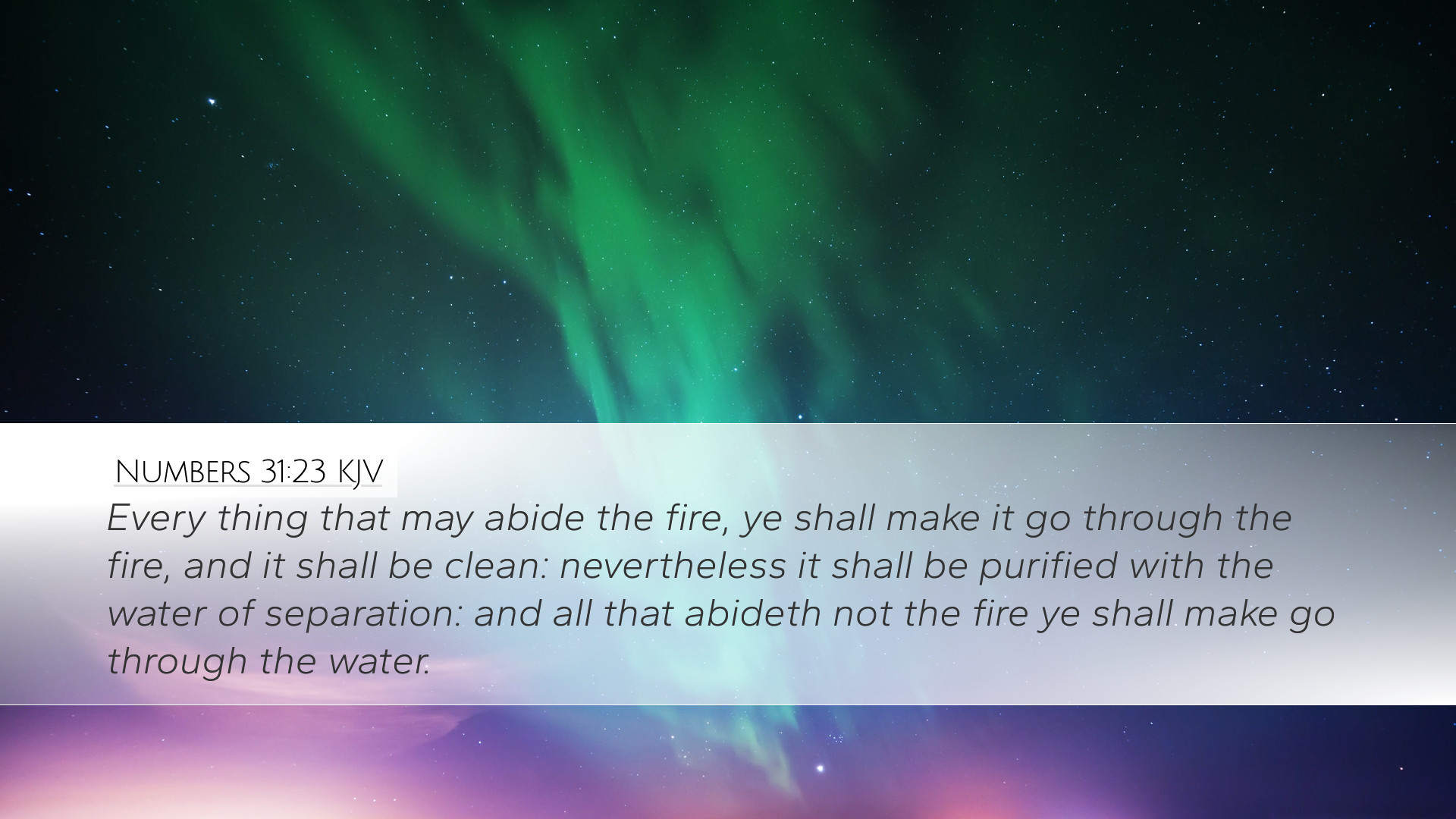Commentary on Numbers 31:23
Verse Context: Numbers 31:23 states, “Everything that can endure the fire, you shall pass through the fire, and it shall be clean; nevertheless, it shall be purified with the water of purification. But all that cannot endure the fire you shall pass through the water.” This verse provides instructions regarding the purification of spoils taken during the war against Midian.
Introduction
The command given in this verse is a significant part of the broader narrative found in Numbers 31, where Israel receives specific instructions following a military campaign against the Midianites. The purification ritual involved here is not merely ceremonial but reflects deeper theological implications regarding holiness, separation from the profane, and the nature of divine commandments.
Theological Implications
This verse invites reflection on several theological themes:
- Purity and Holiness: The actions described in Numbers 31:23 emphasize the importance of purity. The ritualistic cleansing illustrates how God requires His people to approach Him, and the concept of holiness permeates throughout the Old Testament.
- Consequences of Sin: The ritual of purification is rooted in the understanding that sin taints all aspects of life. Just as certain items could be either cleansed by fire or water, so too must believers regularly engage in practices that restore their holiness before God.
- God's Sovereignty: The detailed instructions by God highlight His sovereignty in cleansing His people and their possessions, showcasing His authority over purity and righteousness.
Insights from Matthew Henry
Matthew Henry provides a comprehensive analysis of Numbers 31:23, highlighting that the "fire" represents trials that purify while also serving as a means of distinguishing between that which is valuable and that which is worthless. He notes:
- The earthly impurities of the spoils illustrate the need for spiritual discernment in a believer's life.
- Henry remarks that not everything can withstand the fire, hinting at the necessity of judgment, both present and eschatological.
Insights from Albert Barnes
Albert Barnes expounds on the practical applications of the process of purification, suggesting that the specific mention of fire and water signifies a dual approach to cleansing—spiritual and physical. Barnes highlights:
- The enduring quality of the fire represents trials that test faith and character.
- The water symbolizes the Word of God, which purifies the heart and mind, reinforcing the need for continual spiritual renewal.
- Barnes warns against the dangers of unexamined items in a believer's life, recommending active evaluation against God's standards.
Insights from Adam Clarke
Adam Clarke presents a different perspective, focusing on the cultural and historical context of the Israelites. He underscores:
- The physical act of purification was essential in ancient Israelite culture, symbolizing a communal understanding of cleanliness before God.
- Clarke points out that this passage reflects the larger narrative of the importance of obedience, illustrating that God desires His people to remain distinct from surrounding nations.
Practical Applications for Today
As we reflect on Numbers 31:23, several practical applications emerge for modern believers:
- Spiritual Integrity: Just as the Israelites were instructed in the proper handling of spoils, Christians today must critically engage with their daily lives, ensuring that their pursuits are sanctified before God.
- Regular Self-Examination: The call to purity demands a continuous assessment of one’s life and practices to remain aligned with God's holiness.
- Understanding Trials: Recognizing that trials serve a purpose allows believers to view challenges through the lens of growth, this aligns with the imagery of fire as a purifier.
Conclusion
Numbers 31:23 stands as a reminder of the vital importance of purity and holiness within the believer’s life. By engaging with the insights provided by public domain commentaries, pastors, students, and theologians can appreciate the layered meanings of this text, discovering how ancient practices inform modern faith. As believers navigate the complexities of life, this passage encourages them to pursue a life that honors God’s standards of holiness and discernment.


